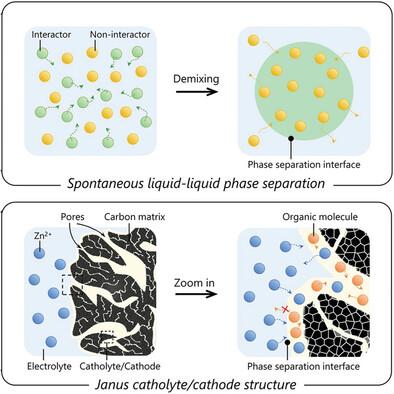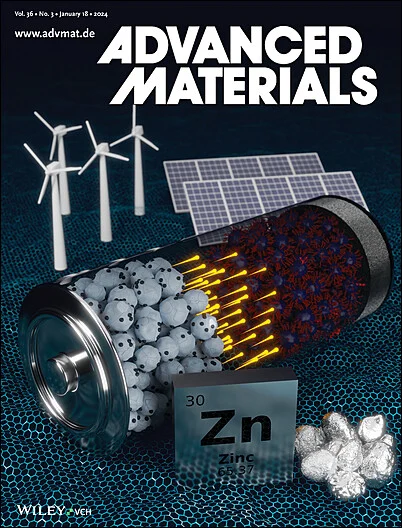构建 Janus 阴极/阴极结构:稳定锌有机电池的新策略
IF 27.4
1区 材料科学
Q1 CHEMISTRY, MULTIDISCIPLINARY
引用次数: 0
摘要
有机材料具有非金属性、环保性和成本效益,是锌离子水电池电极的理想候选材料。然而,有机材料在充放电过程中往往会发生严重溶解,这对其实际应用构成了重大障碍。受细胞中无膜细胞器的启发,我们提出了一种简单而多用途的策略--构建基于液-液相分离的 Janus 阴极/阴极结构电极,在这种电极中,氧化还原活性有机分子被限制在活性炭的液态中,从而消除了体积效应,防止它们扩散到电解质中。利用各种阴离子的疏水性/亲水性差异定制相分离系统的方法已得到成功验证。这种方法可以精确调节离子簇/配位结构,在确保高效离子传输的同时,实现活性物质的封闭。因此,所构建的 Zn||Janus 阴极/阴极电池表现出卓越的可逆速率容量(5.0 A g-1 时为 186 mA h g-1)和显著的循环性能(12 000 次循环后保持率为 72.5%)。构建 Janus 阴极/阴极结构电极的策略摆脱了传统固态电极的限制,为探索多样化的先进电池系统提供了巨大的机遇。本文章由计算机程序翻译,如有差异,请以英文原文为准。

Constructing a Janus Catholyte/Cathode Structure: A New Strategy for Stable Zn-Organic Batteries
Organic materials are promising candidates for the electrodes of aqueous zinc-ion batteries due to their nonmetallic nature, environmental friendliness, and cost-effectiveness. However, they often suffer from significant dissolution during the charge-discharge process, which poses a major hurdle to their practical applications. Inspired by membrane-less organelles in cells, a simple and versatile strategy is proposed—constructing a Janus catholyte/cathode structured electrode based on liquid-liquid phase separation, in which redox-active organic molecules are confined in the liquid state within the activated carbon, thereby eliminating the volume effect and preventing their diffusion into the electrolyte. The customization of phase separation systems by leveraging the hydrophobicity/hydrophilicity differences of various anions is successfully demonstrated. This approach allows for precise regulation of ion cluster/coordination structures, enabling the confinement of active substances while ensuring efficient ion transport. Consequently, the as-constructed Zn||Janus catholyte/cathode cells exhibit superior reversible rate capacity (186 mA h g−1 at 5.0 A g−1) and remarkable cycling performance (retention of 72.5% after 12 000 cycles). The strategy in building Janus catholyte/cathode structured electrodes breaks free from the limitations imposed by traditional solid-state electrodes, offering tremendous opportunities for exploring diverse advanced battery systems.
求助全文
通过发布文献求助,成功后即可免费获取论文全文。
去求助
来源期刊

Advanced Materials
工程技术-材料科学:综合
CiteScore
43.00
自引率
4.10%
发文量
2182
审稿时长
2 months
期刊介绍:
Advanced Materials, one of the world's most prestigious journals and the foundation of the Advanced portfolio, is the home of choice for best-in-class materials science for more than 30 years. Following this fast-growing and interdisciplinary field, we are considering and publishing the most important discoveries on any and all materials from materials scientists, chemists, physicists, engineers as well as health and life scientists and bringing you the latest results and trends in modern materials-related research every week.
 求助内容:
求助内容: 应助结果提醒方式:
应助结果提醒方式:


